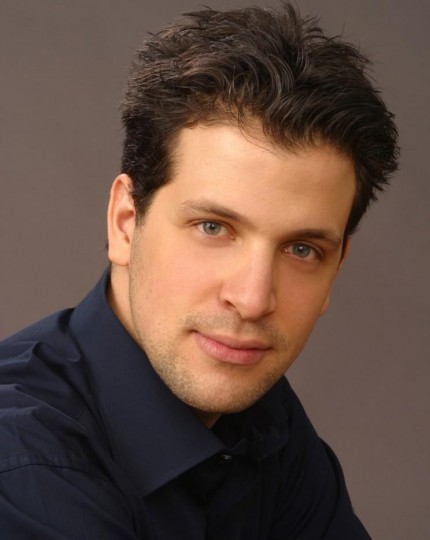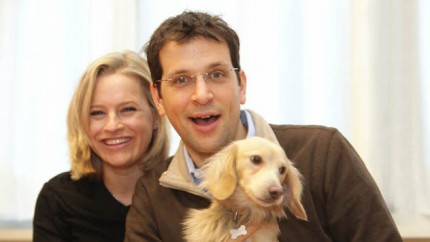Luca Pisaroni’s passion for music leads to a Lyric Opera debut in “Rinaldo”

It wasn’t exactly the future that bass-baritone Luca Pisaroni dreamed of as an opera-obsessed boy growing up in Busetto, Italy, Giuseppe Verdi’s hometown.
It was tenor arias that he sang along to incessantly, trying to match his child’s voice to the soaring, open tones of Pavarotti. It was renowned tenor Carlo Bergonzi, another son of the Busetto region, for whom he hoped to audition as a teenager. (He was told to come back after his voice had fully changed.)
When that change finally arrived, however, Pisaroni wasn’t a tenor. Not only was he not a tenor, he was a bass-baritone, very near the basement of the male vocal range.
“I wasn’t really happy,” said the tall, lanky singer who makes his Lyric Opera debut as the fierce Argante in the company’s new production of Handel’s Rinaldo, which opens Wednesday. Wearing jeans and sweater during an interview backstage, Pisaroni, now in his mid-30s, looked like a relaxed hipster. His dark hair is closely cropped, and his long, serious face accented by dimples, wire-rimmed glasses and the shadow of a beard.
Last month opera lovers across the globe saw him as a touchingly loutish Caliban in the Metropolitan Opera’s HD transmission of a new Baroque pastiche, The Enchanted Island. In the fall he won plaudits for his Leporello in the Met’s new production of Don Giovanni, also seen in HD.
“I always wanted to be a tenor,” Pisaroni said. “I never had the soprano voice as a kid; when I was 12, I was singing all the tenor roles. Then the voice changed and I couldn’t reach any more the high notes. But I have to say, there is such wonderful repertoire for bass-baritone, I cannot complain.”
Indeed, his first encounter with opera was the dark sound of Bulgarian bass Boris Christoff singing Ella giammai m’amo, from Verdi’s Don Carlo. Pisaroni was 8 years old and listening to a CD of opera excerpts at his grandfather’s house. Born in Venezuela to Italian parents, he and his family returned to Italy when he was 4.
“The first aria I heard was with Boris Christoff,” said Pisaroni. “Then I listened to Simon Boccanegra, Attila, Vespri Siciliani. Then I bought my first CD of Pavarotti, and that was it.”
His parents, who still live in Busetto, were not particularly musical, but little Luca became a crazed fan. He saved his money to buy opera CDs and, as he grew older, skimped on meals to pay for performance tickets. Like an obsessed baseball lover, he embarked on operatic fan tours, traveling around Italy attending performances. But even now, Pisaroni can’t explain why he had such a crush on the opera world.
“I don’t know,” he said, sounding genuinely puzzled. “I just had it. The music, the voice–it resonated. I always liked it. I can’t tell you why.”
Pisaroni has been shrewd about pacing his career, starting with small roles and focusing on Mozart and Baroque opera. He is well aware that with careful nurturing, and a little bit of luck, his voice should be able to handle the heavier Verdi roles in future years. However, his teachers at the Verdi Conservatory in Milan, impressed by Pisaroni’s strong, flexible voice, were not so savvy.
“I wasn’t lucky with my teacher,’’ he said. “The issue was the repertoire. For my third-year exam, she was making me sing very heavy things like Nabucco, Macbeth. I was like, ‘I’m 23; I don’t think I should be singing that.’ An alarm went off. ‘If I sing Nabucco now, what am I going to sing when I’m 26? Wotan?’
“I started studying Handel myself with a pianist, and I prepared [arias from] Semele and Semiramide. She said I could do that [for the exam], but I knew she was not the right teacher for me.”
A year’s study with a teacher in Buenos Aires put Pisaroni back on track, and his career began to take off. The year 2002 was a professional—and personal—turning point. He sang Masetto that summer at the Salzburg Festival in a high-profile production of Don Giovanni starring Thomas Hampson and Anna Netrebko conducted by Nikolaus Harnoncourt. That summer he also met Hampson’s daughter Catherine, who is now his wife.
“I was 26 at the time,” said Pisaroni. “Imagine, a baby debuting at Salzburg. I was like a sponge. I was going to every rehearsal even if I wasn’t called, just to breathe the same air, to try to understand what they were doing. I asked a lot of questions, a lot of them. I’m sure Thomas thought in the beginning that I was very annoying.”
Hampson jokingly told Pisaroni that summer that his daughter was off limits.
“I remember when he introduced me,” said Pisaroni with a big smile, “he said, ‘Don’t even think about it.’ But when Thomas found out we were seeing each other, I think he was kind of happy. Actually he liked me before Katrina liked me. She didn’t like me in the beginning—you know, singer, Italian, the worst stereotype. But we started dating and here we are.”

Pisaroni doesn’t hesitate to talk about roles and vocal technique with his celebrated father-in-law.
“He has that ease,’’ said Pisaroni. “I have always loved how easy and free Tom always sounded. I like to go to a performance where you know how difficult it is, but you don’t see the effort. As my current voice teacher says to me, ‘You need to work but nobody needs to see the work that you do.’ I like it when singers sound easy.”
Making it sound easy is particularly difficult in Rinaldo. The part of Argante, the embattled King of Jerusalem, is written high for a bass-baritone, and the king’s opening aria is one of Handel’s most furious.
“His aria comes after five arias by people with high voices, countertenors and sopranos. Then suddenly that completely changes.” said Harry Bicket who will be in the pit for Lyric’s Rinaldo. The English conductor first worked with Pisaroni in 2008 at a Santa Fe Opera production of Handel’s Radimisto directed by David Alden.
“I always think that Argante is someone out of another opera, but also another era,” said Bicket. “It’s like he thought he would be singing Boris Godunov, and he turns left in the corridor instead of right and finds himself onstage in a Handel opera. The great Saracen warrior comes on, and Handel writes completely different music.”
Pisaroni is a strong actor. In The Enchanted Island, his Caliban was a fearsome creature, looking like a Goth rock star in his garish black and white makeup. But he also made us feel the warm, yearning heart beneath Caliban’s outlandish breastplate and robes.
“Before I started professionally, I was very shy, very shy” said Pisaroni. “But I remember the first time I was on stage—I was doing Leporello, only the first act. Before entering, I thought, ‘You know what? What the hell!’ And from that moment, I just threw myself into it.”
“He’s a total theatrical stage creature,’’ said Bicket. “In Handel operas, the basses tend to be secondary characters. But there’s no such thing as a small role in a Handel opera. You have to have hugely experienced people to make these characters really believable and make them come alive. Luca can come on and completely command the scene.”
Rinaldo opens Wednesday and runs through Mar. 24. lyricopera.org; 312-332-2244.
Posted in Articles





Posted Feb 28, 2012 at 12:11 am by Jean Collen
I have been following Luca’s career for several years. He has the voice, stature and personality to become a world-beater. I wish him everything of the best for his debut with the Lyric Opera on Wednesday.